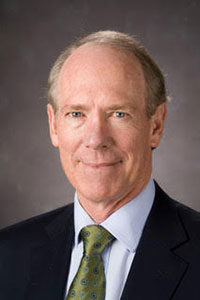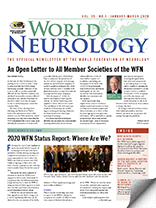Dear Member Society,

William Carroll, MD
At this time of what we all hope is the peaking of the COVID-19 crisis, I write to assure you that the WFN remains functioning normally with none of the trustees, staff, or executives physically affected. We trust that this continues and ask that if any member society is affected adversely in any way that they think we should be aware of, or that we might be able to assist, then please contact the London Office.
For those of you who have been following our Facebook or Twitter feeds or the information on the WFN website or in the WFN newsletter, World Neurology, you will have noticed that the WFN had planned this year to ramp up its visibility, the promotion of brain health in parallel with this year’s World Brain Day, to commence the promotion of the 2021 World Congress of Neurology, and pursue and address the inequities of access to quality neurological care. Most of these activities were to combine both physical attendance at major international meetings and new press campaigns.
With the impact of COVID-19 and the uncertainty of how long this will last, we will be transferring more emphasis of these efforts to the media. The cancellation of the 2020 American Academy of Neurology, the world’s largest neurological meeting, illustrates the likely direction for other major neurological meetings.
It is paramount that neurological disorders and especially non-communicable neurological disorders do not become subsumed by the COVID-19 crisis and the response to it. In addition to providing our full support for the battle with COVID-19 by governments, their health services, institutions and hospitals, we also owe our patients with neurological disorders our reassurance and our vigilance.
Most importantly, drug supply chains, access to medicines and pre-emptive information to those receiving neuro-immunological and other treatments, as to where to find the most appropriate and up-to-date information, will be invaluable to patients in jurisdictions where such services are already fragile. Most of the major neurological disease organizations and national and regional neurological organizations have done these preparations or are making them so it may just be a matter of ensuring the information pertinent to certain member societies is available. Fortunately, COVID-19 appears not to be neurotropic, and although there has been some earlier discussion on this in the literature, there has been no firm evidence to change this view.
In closing, I wish all member societies, their individual members and their families, and above all, our patients, safe passage through this pandemic.
William Carroll
WFN President
